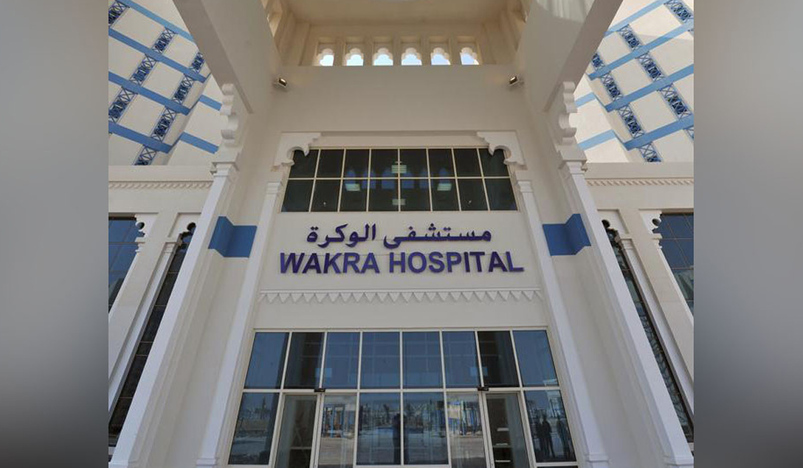
Al Wakra Hospital
The medical team at the Obstetrics and Gynecology Department at Al Wakra Hospital at Hamad Medical Corporation, succeeded in helping a couple who had been suffering from infertility for more than 14 years. After receiving treatment, the wife, in her third decade, gave birth to quadruplets in perfect health, despite facing immune system problems that had previously prevented pregnancy throughout their 14-year marriage.
Dr Lolwa Al Ansari, Senior Consultant and Head of the Obstetrics and Gynecology Department at AWH, explained: "This case is one of many in which we have been blessed by Allah to achieve pregnancy after patients have attempted at other centers. What's unique about this case is that it's the first quadruplet pregnancy since the establishment of the Assisted Reproduction Unit in February 2022. The patient came for follow-up complaining of delayed conception for 14 years, during which she underwent two cycles of in vitro fertilization outside HMC, but without success.”
Dr Lolwa added: "Based on that, the medical team conducted all the necessary tests and examinations, and it was found that the problem was with the mother's immune system. Therefore, a treatment plan was devised for the patient, which included undergoing the IVF procedure and transferring two embryos to the uterus. Two weeks after the procedure, during regular follow-ups, it was discovered that there were not only two but three sacs in the mother's uterus. The mother then continued with immunotherapy, and during routine pregnancy check-ups in the twelfth week, the surprise came when a fourth sac was detected. The mother continued with follow-ups throughout the pregnancy until a successful cesarean delivery was performed in the thirty-first week of pregnancy, and all the newborns were in good health."
"The Assisted Reproduction Unit at AWH is a significant addition, as it has helped accommodate more cases of delayed conception. Since its opening, the unit has received approximately 446 patients, and during this period, over 100 IVF attempts have been made, resulting in a pregnancy rate of up to 65 percent. The unit receivesreferrals from private and governmental centers, as well as HMC hospitals or from infertility clinics. These referrals are reviewed by specialized doctors, sorted, and appointments are scheduled accordingly. Based on the results of the tests and examinations conducted, a treatment plan is formulated, which may involve undergoing the IVF procedure or other interventions," the doctor added.
Regarding the establishment stages of the Assisted Reproduction Unit at AWH, Dr Lolwa pointed out that the clinic initially went through an initial phase of establishing infertility clinics for women and urology clinics for men. Subsequently, the sperm analysis laboratory was completed, and a specialized team was formed. This team underwent intensive training at the main unit in Doha before moving to the unit at AWH, where they gained significant experience in managing cases and ensuring confidentiality in handling them.
The doctor explained that an interview is conducted with both the wife and husband to determine the precise cause of the issue, where their medical history is thoroughly reviewed, and necessary tests are conducted for both sides. They are then treated at the fertility clinic if the treatment is mild or referred to the IVF clinic if required. The factor of age is taken into consideration, so if the patient is over 35 years old, she is given priority. The consultant decides on the appropriate treatment plan, which typically lasts from two weeks to six weeks until the woman enters the operating room for egg retrieval. After that, the fertilization process is completed in the laboratory.
During this period, the embryos are examined daily, even on weekends and holidays, to monitor their progress and provide a daily report on the appropriate timing for embryo transfer into the uterus. Dr. Lolwa noted that in the vast majority of cases, the embryo transfer procedure is performed on the third or fifth day after IVF, or the embryos are frozen for pre-implantation genetic testing, which is a crucial process, especially if there are genetic diseases in the family. Upon the success of the IVF procedure and confirmation of pregnancy, the case is transferred for regular follow-up in the prenatal clinics.
Dr Lolwa emphasized the medical team's commitment at the Assisted Reproduction Unit at AWH to provide necessary psychological support to patients undergoing the IVF experience throughout the treatment period. She noted that infertility significantly affects both partners.
.jpg)
Qatar Secures Place Among the World's Top 10 Wealthiest Nations
.jpg)
Hamad International Airport Witnesses Record Increase in Passenger Traffic

Saudi Arabia: Any visa holder can now perform Umrah

What are Qatar's Labour Laws on Annual Leave?
Leave a comment